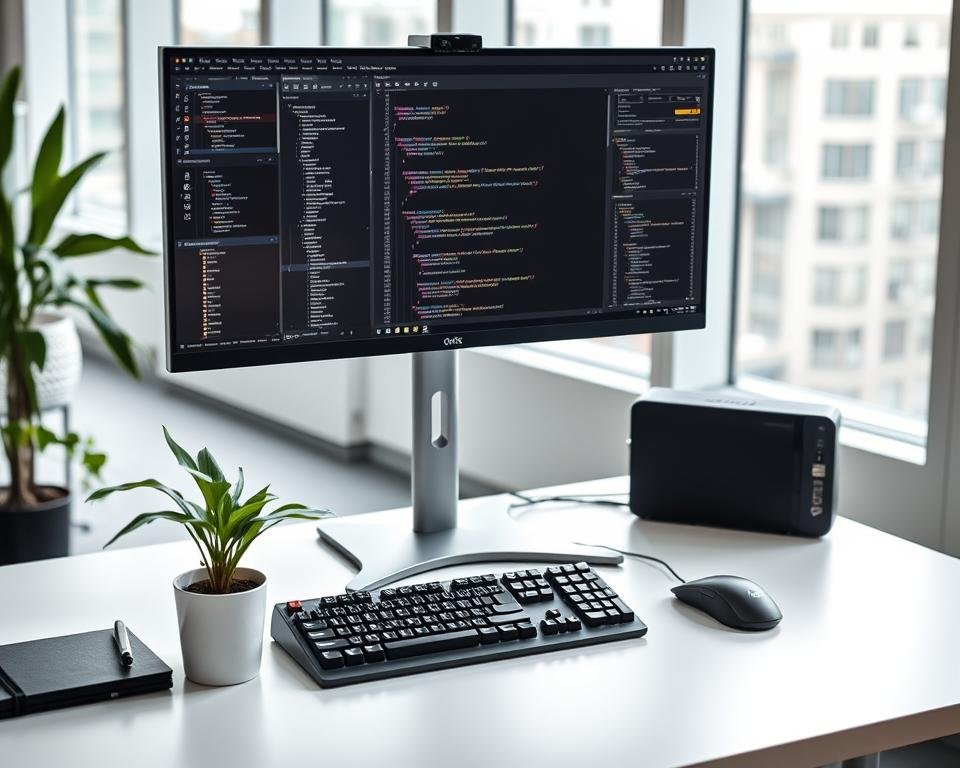When I started learning programming, I found some techniques are key. It’s not just about typing code. It’s about getting the logic, fixing bugs, and working with others.
I aim to give a detailed guide on computer science basics, best ways, and advanced methods. Learning these skills helps improve coding and keeps up with new trends.
Key Takeaways
- Understanding the logic behind code is key.
- Debugging is a must for programmers.
- Working together is vital for project success.
- Knowing the basics is essential for growth.
- Keeping up with new practices is important.
Understanding the Basics of Coding
Coding starts with basic rules that every coder should know. To get good at coding, you need to understand what it is, why it matters, and the many programming languages out there.
What is Coding?
Coding, or computer programming, is about making, writing, testing, and keeping computer programs alive. It’s a set of instructions that computers can follow. Coding is key for making software, websites, and other tech stuff.
Importance of Learning to Code
In today’s world, knowing how to code is very important. It opens doors in software development and web development, and more. Learning to code lets you make new things, automate tasks, and boost your career.
Different Programming Languages Explained
There are many coding languages, each with its own special traits and uses. Python is simple and flexible. JavaScript is great for websites. Java is for big projects. Knowing these languages is important for any coder.
Learning the basics of coding, including different languages and their uses, helps you succeed in tech.
Getting Started with Coding
The world of coding is huge and full of chances for those who want to learn. When I start coding, picking the right tools and language is key.
Setting Up Your Coding Environment
To start coding, I need a good place to work. This means installing the right software and tools. Coding tutorials often help with this. Choosing a code editor or IDE that fits my language is important.
Popular code editors include Visual Studio Code, Sublime Text, and Atom. Each has special features. It’s good to explore and find the best one for me.

Choosing the Right Programming Language
There are many programming languages out there. Picking the right one can be hard. But, thinking about my goals and projects helps narrow it down. Coding resources can show the strengths of different languages.
- Python is easy to learn and great for beginners.
- JavaScript is everywhere in web development, making it very useful.
- Java is big in business and Android apps.
By looking at these points and trying out languages, I can choose wisely.
Key Coding Concepts to Master
As I explore coding, I find some concepts are key to improving my skills. Mastering these is vital for tackling various projects and using coding tools well.
Variables and Data Types
Variables and data types are basic to coding. Variables hold and change data, while data types show what kind of value a variable can have. Common types include integers, floats, strings, and booleans.
In coding projects, I might use a variable for a user’s name or age. Using variables and data types right makes my code better and less prone to errors.
Example of Data Types and Their Uses:
| Data Type | Description | Example Use |
|---|---|---|
| Integer | Whole numbers | Counting, indexing |
| Float | Decimal numbers | Scientific calculations |
| String | Text | User input, messages |
Control Structures: If, Else, and Loops
Control structures are vital for my code’s flow. They let me decide and repeat actions based on conditions.
For instance, “if” and “else” statements let me run different code parts based on conditions. Loops, like “for” and “while,” let me repeat code blocks many times.

Functions and Methods
Functions and methods are blocks of code that do specific tasks. They help organize my code, cut down on repetition, and make it easier to keep up.
By making a function or method, I can use it many times in my code. I can pass different values each time. This makes handling big projects easier.
Benefits of Using Functions:
- Code reusability
- Improved readability
- Easier maintenance
Best Practices for Writing Clean Code
Writing clean code is key for programmers. It’s not just good practice, but necessary for working together and keeping code up to date.

Importance of Code Readability
Code readability is very important. It makes it easy for others (and you) to get your code. Readability is key to efficient coding.
To make code readable, use simple and clear language. Don’t make things too complicated. Break big functions into smaller ones.
Commenting Your Code Effectively
Commenting your code is also very important. Comments explain what your code does. This makes it easier for others to get your ideas.
When you comment, be clear and to the point. Don’t repeat what the code says. Use comments for complex parts or to add context.
Using Meaningful Variable Names
Meaningful variable names help a lot. They make it clear what each variable does. This makes your code easier to understand.
For good variable names, avoid short codes unless everyone knows them. Use names that clearly show what the variable is for.
By following these tips, you’ll write code that’s easy to keep up with. Your code will last a long time.
Debugging: Finding and Fixing Errors
Debugging is key for coders. It helps find and fix errors, making sure software works right.
Debugging means finding, fixing, and solving code problems. It’s a big part of making software. You need tech skills, patience, and detail.
Common Coding Errors and How to Avoid Them
Many coding errors are easy to fix. Common ones include syntax, logical, and runtime errors. To avoid these, know programming basics and use good coding practices.
Here are tips to avoid common errors:
- Syntax Errors: These happen when code breaks language rules. To avoid them, check your code well and use tools like linters.
- Logical Errors: These happen when code doesn’t work as expected. To avoid them, break down big problems and test your code well.
- Runtime Errors: These happen when code meets unexpected problems. To avoid them, think ahead and handle exceptions well.

Tools for Debugging Code
Many tools help with debugging. Some popular ones are:
| Tool | Description | Platform |
|---|---|---|
| Chrome DevTools | A set of web developer tools built directly into the Google Chrome browser. | Web |
| Visual Studio Debugger | A powerful debugger for .NET and C++ applications. | Windows |
| LLDB | A high-performance debugger for C, C++, and other languages. | macOS, Linux |
These tools make finding and fixing errors easier. They save time and reduce stress.
Version Control Systems: A Must for Coders
One key tool for coders is a version control system. It helps manage code changes well. These systems are vital for coding projects. They let developers track changes, work together, and keep different code versions.
Understanding Git and GitHub
Git and GitHub are top tools for version control. Git tracks changes in your code. GitHub hosts your Git repositories for team work. Git lets you branch, merge, and manage project versions. GitHub makes it easy to work together and manage projects online.

Benefits of Using Version Control
Git offers many benefits. It lets many developers work on one project at once. You can go back to old code versions if needed. It also keeps a clear change history, helping you see your project’s growth.
Here are some key benefits of using version control:
- Collaboration: Work with other developers on the same project without conflicts.
- Version History: Keep a record of all changes made to your code.
- Backup: Ensure that your code is backed up and can be recovered in case of data loss.
- Experimentation: Create branches to experiment with new features without affecting the main codebase.
| Feature | Git | GitHub |
|---|---|---|
| Version Control | Local version control system | Web-based platform for Git repositories |
| Collaboration | Supports collaboration through branches | Enhances collaboration with pull requests and issues |
| Code Hosting | Does not host code | Hosts Git repositories |
In conclusion, tools like Git and GitHub are key for coding today. They help manage code, work together, and track versions.
Enhancing Your Coding Skills
Improving your coding skills takes time and effort. It’s important to keep up with new coding methods and best practices. This is key for anyone who wants to code well.
To get better at coding, use online tools and learning sites. Sites like Codecademy, Coursera, and Udemy have many coding tutorials. They help at all levels and with many programming languages.
Online Resources and Learning Platforms
Online learning is flexible and easy to access. You can learn at your own speed. Here are some top resources:
- Codecademy: Offers interactive coding lessons in various programming languages.
- Coursera: Works with top universities to teach computer science and programming.
- Udemy: Has lots of courses on programming topics.
- FreeCodeCamp: A non-profit that teaches web development.
These sites teach theory and offer practical coding projects. They help you use what you’ve learned.

Joining Coding Communities
Being part of coding groups is also helpful. These groups are supportive. You can learn, share, and get feedback on your work.
Some great groups include:
- GitHub: A place for version control and teamwork. It has open-source projects and developer connections.
- Stack Overflow: A Q&A site for programmers to ask and share knowledge.
- Reddit: Subreddits like r/learnprogramming and r/webdev are community-driven. They help with learning and discussing coding.
By joining these groups and doing real projects, you can get better at coding. You’ll also keep up with the latest trends.
Real-World Applications of Coding
Coding is more than just writing code. It solves real-world problems. It shapes our modern world in many ways.
Coding has many uses. It helps make software, websites, and smart machines. Let’s look at where coding really matters.
Software Development
Software development is a big deal for coding. It makes programs for work, fun, and learning.
Key areas in software development include:
- Mobile app development
- Operating system development
- Gaming
Web Development
Web development is another big area for coding. It builds and keeps websites and apps running.
The web development process includes:
- Front-end development using HTML, CSS, and JavaScript
- Back-end development using server-side languages like Python, Ruby, and PHP
- Full-stack development, which combines both front-end and back-end development
Data Science and Machine Learning
Data science and machine learning are growing fast. They need coding a lot. Data science finds insights in data. Machine learning lets machines learn and predict.
Some key coding languages used in data science and machine learning are:
| Language | Application |
|---|---|
| Python | Data analysis, machine learning, and natural language processing |
| R | Statistical analysis and data visualization |
| Julia | High-performance computing and machine learning |
Knowing how coding is used in real life helps choose a career. It shows how coding affects our daily lives.
Advanced Coding Techniques
Exploring advanced coding techniques has opened up new ways to enhance my programming skills. I’ve learned about object-oriented programming and functional programming. These methods help me write code that is efficient, scalable, and easy to maintain.

Object-Oriented Programming
Object-Oriented Programming (OOP) centers on objects and classes. It uses principles like inheritance, polymorphism, and encapsulation. These help me organize my code in a structured and reusable way.
Using OOP, I can build complex systems that are simpler to understand and keep up. For example, I can make a class that holds data and actions. This makes it simpler to change or add to the code without messing up other parts.
Key benefits of OOP include:
- Modularity: Breaking down the code into smaller, independent modules
- Reusability: Reusing code through inheritance and polymorphism
- Easier maintenance: Modifying code without affecting other parts of the system
Functional Programming
Functional Programming (FP) focuses on pure functions, immutability, and avoiding state changes. By using FP, I can write code that’s more predictable, composable, and easier to understand.
FP teaches me to see my code as functions that take input and give output without changing anything. This makes my code easier to test, debug, and keep up.
Key benefits of FP include:
- Predictability: Code behaves consistently and is easier to reason about
- Composability: Functions can be combined to create more complex behavior
- Easier debugging: Code is less prone to errors due to side effects
The Importance of Testing Your Code
As a developer, I’ve learned that testing code is not just a good practice. It’s a must for delivering high-quality software. Testing finds bugs and errors early, saving time and money to fix them later.
Effective testing uses different methods to make sure your code works right. Knowing about different types of testing is key.
Types of Testing: Unit, Integration, and System
There are several types of testing you should know:
- Unit Testing: This tests individual code units, like functions or methods, to see if they work right.
- Integration Testing: This checks how different code units work together as a system.
- System Testing: This tests the whole system to make sure it meets all requirements and works as expected.
Each type of testing is important for ensuring your software’s quality.
Tools for Automated Testing
Automated testing is key in modern software development. It saves time and cuts down on human mistakes. Here are some top tools for automated testing:
| Tool | Description | Supported Languages |
|---|---|---|
| Selenium | An open-source tool for automating web browsers. | Java, Python, Ruby, C#, JavaScript |
| JUnit | A unit testing framework for Java. | Java |
| PyUnit | A unit testing framework for Python. | Python |
Choosing the right tools for automated testing boosts your testing’s efficiency and success.
Future Trends in Coding
The world of coding is always changing. It’s important for coders to stay ahead. Two big trends are the rise of low-code and no-code platforms and AI’s growing role in coding.
Low-Code and No-Code Revolution
Low-code and no-code platforms are changing coding. They let users make apps without needing to know a lot of code. This makes coding easier and more people can join in.
Because of this, there’s a growing need for coders who know how to use these platforms.
AI’s Impact on Coding
AI is also changing coding. AI tools help developers do tasks faster and write code better. As AI gets better, it will change how we code even more.
It’s key for coders to keep up with AI and coding resources.
FAQ
What are the essential coding techniques everyone should know?
To be good at coding, you need to know the basics and advanced stuff. You should learn about variables, data types, and how to control your code. It’s also important to know about coding languages, debugging, and managing your code changes.
How do I get started with coding?
To start coding, first set up your coding space. Pick a programming language you like. Use online tools and join coding groups to learn and get better.
What is the importance of code readability?
Code that’s easy to read is key for working together and keeping things running smoothly. Use clear names for your variables and add comments. This makes your code simple to understand and fix.
What are some common coding errors and how can I avoid them?
Common mistakes include syntax, logical, and runtime errors. To avoid these, learn the basics, use debugging tools, and test your code well.
What is the role of version control systems in coding?
Version control systems like Git and GitHub are vital for managing code changes and team work. They help you keep track of changes, go back to old versions, and work with others on projects.
How can I enhance my coding skills?
To get better at coding, keep learning and practicing. Use online resources, join coding groups, and work on projects. Doing coding challenges can also help you get better.
What are some real-world applications of coding?
Coding is used in many areas like software, web, data science, and machine learning. Knowing these uses can help you pick the right career and keep improving.
What are some advanced coding techniques?
Advanced techniques include object-oriented and functional programming. Learning these can make your code better and more efficient. It helps you stay ahead in coding.






